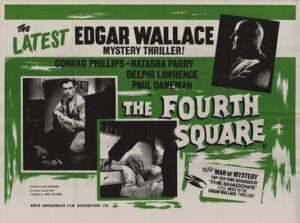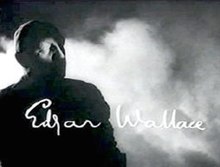The Fourth Square *** (1961, Conrad Phillips, Natasha Parry, Delphi Lawrence, Miriam Karlin, Jacqueline Jones, Anthony Newlands, Basil Dignam, Harold Kasket) – Classic Movie Review 13,316
The 1961 British second feature crime film The Fourth Square stars Conrad Phillips, Natasha Parry and Delphi Lawrence, in which a solicitor and the London police compete to investigate thefts of emerald jewellery.
Director Allan Davis’s 1961 British second feature crime film The Fourth Square stars Conrad Phillips, Natasha Parry and Delphi Lawrence, in which a solicitor and the London police compete to investigate thefts of emerald jewellery.
It is part of the series of Edgar Wallace Mysteries films made at Merton Park Studios from 1960 to 1965. The screenplay by James Eastwood is based on the 1929 Edgar Wallace novel Four Square Jane.
The Fourth Square is a kitschy, campy, quite lively, niftily made and decently written episode, unravelling an old-style crime story mixing jewel thefts with murders. James Eastwood controls the complex plot well, condensing it pretty adroitly into just 57 minutes, and writes in some nice quirky roles for the actors to get their teeth into, with four excellent female star parts.
Conrad Phillips is fine in a smooth and smarmy turn as the investigator Bill Lawrence, unusually a solicitor, hired by Delphi Lawrence as Nina Stewart to find her piece of stolen emerald jewellery, a ring. It turns out that there are other stolen jewels from the same set, three more in fact, completing the four squares, all linked to lovely ladies, the former playthings of womanising playboy Tom Alvarez (Anthony Newlands) who gifted them the jewels. The thief is leaving a clue of four squares on the walls beside the scenes of the robberies. All four robberies take place in London squares. Yes, well, that’s very neat but very pointless too. It probably had more logic and sense in the source novel. Here it just muddles the investigation.
These lovely ladies also include Natasha Parry as Sandra Martin, Miriam Karlin as Josette, and Jacqueline Jones as Marie Labonne. Parry is brisk and capable, Karlin is ripe and camp as a, er, French (!) cabaret entertainer, and Jones is camp as a brainless gold-digging starlet type. Delphi Lawrence is marvellously snooty and imperious, a hard diamond. Parry, Lawrence and Karlin must have wondered where the heck their careers were going, but then work is work, however humble, and Merton Park Studios caught some fine performers at the right time in their careers. It’s one of the main pleasures of these Edgar Wallace movies.
The less said about Barrie Ingham’s gay hairdresser Gordon, the better, but we can say that it is not quite as oppressive as it could have been. All four women have had home hair visits from Gordon, so he’s high on the list of suspects. Basil Dignam plays the investigating Inspector Forbes with sombre dignity, and huge politeness. He’s not going to be fooled, and he cannily lets the hero do all the spade work of the investigation, Who said a policeman’s lot is not a happy one?
Barrie Ingham also appears in the 1962 Edgar Wallace Mysteries film Number Six. His finest hour is playing Robin Hood in the 1967 A Challenge for Robin Hood.
Conrad Phillips
Conrad Philip Havord (born Conrad Phillips on 13 April 1925, and died on 13 January 2016) is best known for playing William Tell in the ITV adventure series The Adventures of William Tell (1958–1959).
The cast
The cast are Conrad Phillips as Bill Lawrence, Natasha Parry as Sandra Martin, Delphi Lawrence as Nina Stewart, Paul Daneman as Henry Adams, Miriam Karlin as Josette, Jacqueline Jones as Marie Labonne. Anthony Newlands as Tom Alvarez, Basil Dignam as Inspector Forbes, Harold Kasket as Philippe, Edward Rees as Sergeant Harris, Jack Melford as Stewart, Vilma Ann Leslie as Fiona Foster, Gwen Williams as Mrs. Potter, Barrie Ingham as Gordon, Constance Lorne as lady in hairdressers, Rachel Lloyd as receptionist, John Warwick as police Sergeant, Keith Goodman as 1st uniformed police constable, Tom Gill as 2nd uniformed police constable, Edward de Souza as 1st reporter, Marina Martin as 2nd reporter, Peter Thomas as 3rd reporter, Frank Porter as compere, Nicolas Chagrin as Michel, and George Hilsdon as police constable.
© Derek Winnert 2024 – Classic Movie Review 13,317
Check out more reviews on http://derekwinnert.com
The Edgar Wallace Mysteries
There were 48 films in the British second-feature film series The Edgar Wallace Mysteries, produced at Merton Park Studios for Anglo-Amalgamated and released in cinemas between 1960 and 1965.
Crossroads to Crime (1960) and Seven Keys (1961) were not shot as part of the series but were later included. Urge to Kill (1960) may not originally have been intended as part of the series.
- Urge to Kill (March 1960)
- Clue of the Twisted Candle (September 1960)
- The Malpas Mystery (October 1960)
- Marriage of Convenience (November 1960)
- The Man Who Was Nobody (December 1960)
- Partners in Crime (February 1961)
- The Clue of the New Pin (February 1961)
- The Fourth Square (June 1961)
- Man at the Carlton Tower (July 1961)
- Clue of the Silver Key (August 1961)
- Attempt to Kill (September 1961)
- Man Detained (October 1961)
- Never Back Losers (December 1961)
- The Sinister Man (December 1961)
- Backfire! (February 1962)
- Candidate for Murder (February 1962)
- Flat Two (February 1962)
- The Share Out (February 1962)
- Number Six (April 1962)
- Time to Remember (July 1962)
- Solo for Sparrow (September 1962)
- Playback (September 1962)
- Locker Sixty-Nine (September 1962)
- Death Trap (October 1962)
- The Set Up (January 1963)
- Incident at Midnight (January 1963)
- The £20,000 Kiss (January 1963)
- On the Run (February 1963)
- Return to Sender (March 1963)
- Ricochet (March 1963)
- The Double (April 1963)
- To Have and to Hold (July 1963)
- The Partner (September 1963)
- Accidental Death (November 1963)
- Five to One (December 1963)
- Downfall (January 1964)
- The Verdict (February 1964)
- We Shall See (April 1964)
- The Rivals (May 1964)
- Who Was Maddox? (June 1964)
- Face of a Stranger (September 1964)
- Act of Murder (September 1964)
- Never Mention Murder (November 1964)
- The Main Chance (November 1964)
- Game for Three Losers (April 1965)
- Change Partners (July 1965)
- Strangler’s Web (August 1965)
- Dead Man’s Chest (October 1965)



